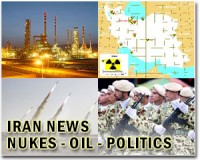| . |  |
. |
Beijing (AFP) Oct 14, 2009 Russian Prime Minister Vladimir Putin said Wednesday that it was "too early" to discuss new sanctions against Iran, as world powers try to defuse the standoff over Tehran's disputed nuclear programme. Putin's comments, which came during a visit to Beijing, were his first since the revelation late last month that Iran is building a new uranium enrichment plant near its holy city of Qom, reviving fears about its nuclear intentions. "I believe it's too early to speak of them," Putin told reporters, when asked about the possibility of fresh sanctions against Tehran. "There is no need to scare the Iranians," the prime minister said. "There is a need to reach agreements, there is a need to search for compromises." However, he warned, that if talks "don't take place or end in a fiasco, we can speak of further steps". Tehran says its atomic programme is for peaceful energy purposes but the United States, the European Union and Israel fear that it is seeking to build the bomb. Negotiations over the issue have been strained but Iran has recently tried to make a show of greater cooperation since taking part in talks in Geneva with six major world powers on October 1. Iran agreed at that meeting to allow United Nations inspectors into the previously secret nuclear site near Qom and to send low-enriched uranium abroad for enrichment to a higher level. The plan to enrich uranium abroad -- which will be discussed further at a meeting in Vienna next Monday -- has been seen as a possible way to defuse the standoff. Iran and the six other nations -- Britain, France, Russia, China, Germany and the United States -- are to meet at the end of October for a second round of talks aimed at allaying Western concerns over Tehran's nuclear programme. Putin said the international community needed to exhaust the negotiations route with Iran before considering any other options. "If now, without making any concrete steps, we were to be announcing some sort of sanctions, then we would not be creating favorable conditions" for further talks and the resolution of the issue, he said. Russia's position on the possibility of further sanctions has been closely watched as the standoff over Iran's nuclear programme intensifies. As a permanent, veto-holding member of the UN Security Council, Moscow would need to support new sanctions against Tehran for them to be effective. Russia has the closest ties to Iran of any major world power and has long been opposed to tougher sanctions. Putin's comments in Beijing came while US Secretary of State Hillary Clinton -- who has sought to impose stricter sanctions against Iran if Tehran does not fulfill its promises -- was visiting Russia. In high-level talks on Tuesday, Clinton won no public pledge from Moscow that it would back tougher steps like sanctions if negotiations failed, something one of her aides said she had been hoping to achieve. "Threats of new sanctions and pressure against Iran under current circumstances are counterproductive," Russian Foreign Minister Sergei Lavrov said after the talks with Clinton. "There are situations where sanctions are inevitable, when all other avenues are exhausted. But with Iran we are very far from this," Lavrov added. A senior US administration official later said he was "surprised" by how strong Lavrov's statement was but insisted Russia and the United States were on the same page on Iran. Moscow says it does not want Iran to obtain a nuclear weapon but it also strongly opposes the option of using military air strikes to prevent it from building an atomic bomb. Russia is also helping Iran build its first nuclear power plant near the southern city of Bushehr, a project that has raised concerns in the West. Putin also told reporters before leaving China that Gazprom and China's CNPC had agreed in principle on a pricing mechanism for future Russian gas deliveries to the energy-hungry Asian giant. Putin said the Russian gas giant and China National Petroleum Corp would peg the gas price to an "Asian oil basket", without elaborating. "The issue of calculating a pricing formula has been solved in principle," he said, calling it the "most sensitive issue" in the long-running negotiations. burs-ft/sas Share This Article With Planet Earth
Related Links Learn about nuclear weapons doctrine and defense at SpaceWar.com Learn about missile defense at SpaceWar.com All about missiles at SpaceWar.com Learn about the Superpowers of the 21st Century at SpaceWar.com
 Russia declines Iran sanctions pledge on Clinton visit
Russia declines Iran sanctions pledge on Clinton visitMoscow (AFP) Oct 13, 2009 Secretary of State Hillary Clinton Tuesday presented a united front with Russia on the nuclear showdown with Iran but Moscow stopped short of backing US calls for sanctions if diplomacy fails. On her first trip to Russia as chief US diplomat, Clinton praised Moscow for its "extremely cooperative" behaviour in the standoff over Iran's programme, which Western nations fear hides a drive to ... read more |
|
| The content herein, unless otherwise known to be public domain, are Copyright 1995-2009 - SpaceDaily. AFP and UPI Wire Stories are copyright Agence France-Presse and United Press International. ESA Portal Reports are copyright European Space Agency. All NASA sourced material is public domain. Additional copyrights may apply in whole or part to other bona fide parties. Advertising does not imply endorsement,agreement or approval of any opinions, statements or information provided by SpaceDaily on any Web page published or hosted by SpaceDaily. Privacy Statement |